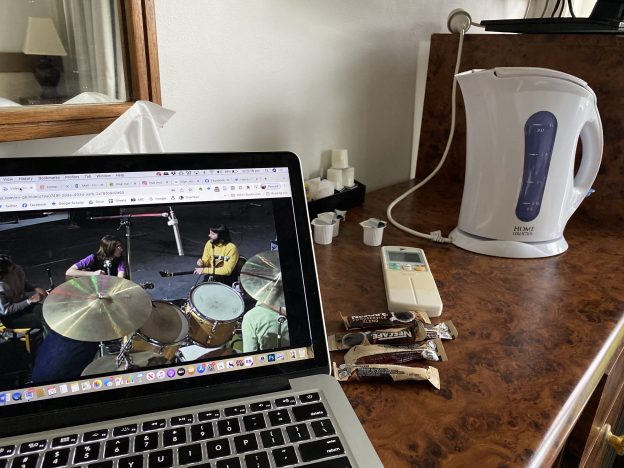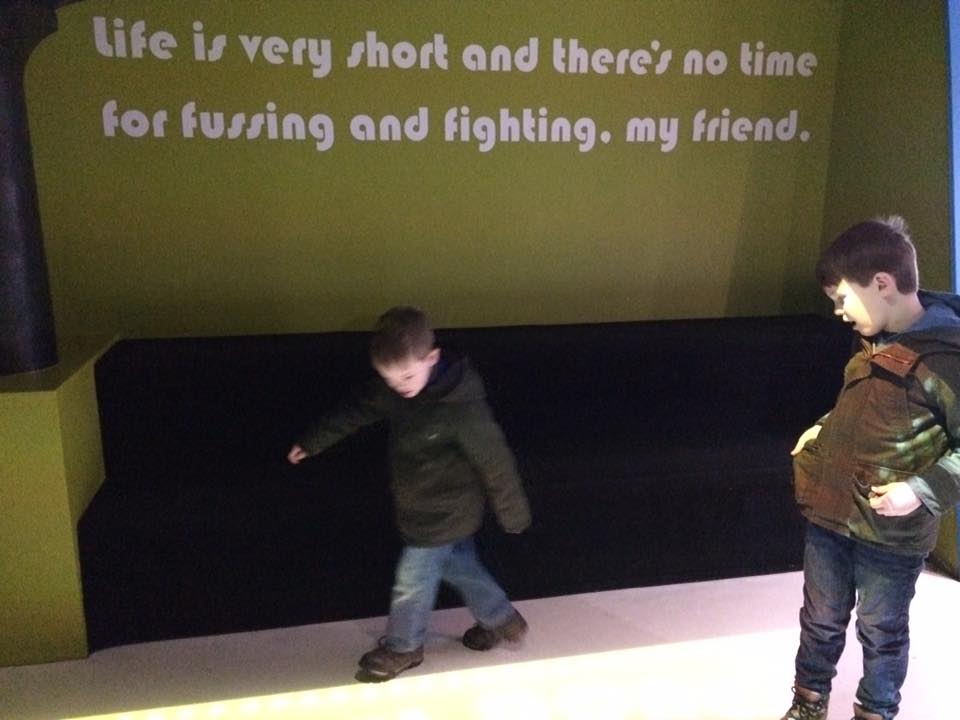2pm Saturday, November 27
I’m sitting all by myself in a motel room in Cooma, waiting for Part 3 to drop. It’ll turn up right here, on this laptop, any time from about 7pm Australian Eastern Standard Time, when it finally clicks over to Saturday in Los Angeles. I’m talking about Peter Jackson‘s marathon documentary Get Back, streaming now on Disney Plus. It takes us back to the month of January, 1969, in which the Beatles are hard at work in two studios, writing and rehearsing material for their next album. With clashing schedules – Ringo has promised himself to a film crew in February – the whole project needs to be in the can by the end of the month.
The footage was originally shot for a television special that never eventuated. Instead, it was cut into the 1970 film Let it Be, which emphasised fractures in the band and was forever associated with its break-up. The Beatles didn’t like the film, and it was quietly withdrawn from circulation after limited release.
Jackson’s Get Back is a completely new edit of the original material, revealing footage that has never previously been made public. It shows John, Paul, George and Ringo in full flight, gloriously young and far less fractious than the original cut suggested. Jackson has used 21st century technology to restore picture and sound to give an immediacy, immersion and vibrancy that almost seems too good to be true. We’re right there in the room with them as they jam, joke, argue, smoke, drink, stand up, sit down and sometimes dance. Ringo has already tweeted that he loves it, and Paul does too, so it passes muster on that front. It goes for about eight hours, divided into three chunks, culminating in the famous rooftop performance above the Beatles’ own Apple studios in Savile Row, London.
In his review in the Guardian, Alexis Petridis describes the documentary as “eight hours of TV so aimless it threatens your sanity”. I’ve only seen the first two chunks – as I said, I’m waiting for the third to drop – but I’m more than ready to leap to Jackson’s defence. Get Back is long, but it’s far from aimless. It successfully, respectfully and joyously makes the most of the precious raw footage made available to him. It is beautifully framed, crafted, paced and contextualised. Yeah, it’s long, but for me that’s not just a bonus but a hallelujah. Never assume that I don’t want to watch someone eat a biscuit.
Okay, so just to get something out of the way. Like Jackson and – oh, a few million humans around the world – I’ve been a fan for a long time. I do believe that some things can be ubiquitous and excellent at the same time. (Galahs are another example.) Back in August, in the middle of lockdown, I happened to catch Eight Days a Week, Ron Howard’s documentary about the Beatles’ touring years, on SBS TV. I was moved to tears for days afterwards, in a way that I couldn’t quite explain. A sort of exquisite grief. I’d always loved the Beatles but now I found myself at the bottom of a rabbit hole, tunnelling up, down and sideways. I watched YouTube clips, I downloaded whole albums, gave myself virulent ear-worms. I tracked down movies like Backbeat about the band’s Hamburg days, and Nowhere Boy about Lennon’s childhood. I’d get sick of it and write myself post-it notes to stick to my computer: BEATLES-FREE DAY! (I had other work to do). To no avail. I’d find myself sliding back to the Beatles Bible for another factoid. In other words, over just a few weeks I reached a tipping point. I went from common-or-garden fan to fully-fledged Beatles tragic.
Which is to say that this review contains not a shred of objectivity. It is the enthusiasm of one tragic for the work of another tragic.
But then, as I just said, there are a lot of us around. If you gather common-or-garden fans plus tragics plus ordinary people hearing snatches of music in supermarkets aisles feeling a stab of pure nostalgia, then we have a strong case for the very long version. We really do care that much. You wouldn’t do it in 1970, but because the Beatles have been continuously gathering meaning ever since – social, historical, personal – over the ensuing 50 years, there’s a case for a the long, slow, forensic version.
Not that their cultural importance is universal, or forever.
I find myself thinking about BTS, the Korean boy band that is huge right now, at least as important to teenagers now as the Beatles were in the 1960s. There are seven boys for young people to swoon over. Each has a different look, a different personality. They write their own songs. Where the Beatles had Apple Scruffs, BTS has its Army. The BTS video clip, “Dynamite“, has had 1.3 billion views on YouTube. (“Hey Jude”, by way of contrast, has had 41 million views.) It’s all about what Donna Haraway calls “situated knowledges“. There’s no God’s eye view; only particular, situated views.
Jackson’s documentary is not supposed to be universal; it’s for the lovers. That may seem indulgent, but it fits with the way we consume media these days. In an era of personalised media consumption, often consumed alone, wearing earplugs, “content” (I hate that word but it’s the best description for “things we watch, listen to and interact with”) is changing. Released from the constraints of cinema release and time slots on free-to-air television, content-producers are more free to play around with the parameters. Content can be stretched and adapted in all sorts of ways. It can get down to very specific audiences, subsets of subsets. For example I can sit here in this two-star motel in Cooma and pursue my interest with abandon. I don’t have to drag my partner into this, or family members. It’s just me and this lil screen, mooning and communing.
I do like a director’s cut. Sometimes I want to see an artist’s vision in its entirety. There are times and places for constraint but we’ve bent the stick too far. There’s too much asking audiences what they want, too much market research. I often think about Tiny Tim. Nobody knew they wanted Tiny Tim; he arrived in all his bizarre glory and added something really nuts to the party.
Having said all that, I will admit that some parts of Jackson’s documentary do drag. For example, there’s the bit where the band is sitting around at the Twickenham film studio doing absolutely nothing. They face the camera, listlessly. The actor Peter Sellers joins them and sits there, awkwardly (he’s working on The Magic Christian, the film that Ringo will start work on in February). Sellers is famous for being funny but in this particular instance, nothing funny emanates from him and conversation fails to take flight. After a moment he gets up and wanders off. Perhaps this sequence could have been left out. But then we’d miss seeing the Beatles listless, Sellers awkward. There’s something in this. Creativity is often about showing up, getting irritated, feeling awkward. There will be down time, flatness and boredom. It may look aimless (and in that moment the Beatles themselves were certainly pretty aimless) but part of Jackson’s aim, I believe, is to show this. This is how albums and films and books are actually made.
Then again, maybe I’m just happy to look at these four young people under any circumstances at all. To paraphrase George Harrison: I’d have them any time. I just want to be around the magic. I want to be there when John Lennon and Paul McCartney, playing their guitars, look intently into each other’s eyes for cues and inspiration, excluding the rest of the world. I want to see Ringo start drumming and George experimenting on the guitar, supporting and co-creating something we’ll still be talking about in 50 years time.
The story arc that languidly – and finally with more urgency – emerges out of it all is Paul McCartney trying to keep the band together, to try something new that will get John out of his drug-addled, love-sodden state, that will get George to hang in despite feeling bossed around and overlooked. While Ringo seems happy to keep playing along indefinitely, Paul is at real and immediate risk of losing the other two.
As I’ve said elsewhere, I’m a Lennon girl (and more George & Ringo as time goes on), and have never particularly warmed to Paul, but watching Get Back, you can only be astonished. His surging creativity is almost supernatural. You can see he wants to play all the instruments himself, tell everyone what to do, make the world realise his ideas, but he forces himself to tone down, to stick to his bass as required, to preserve the unity of the group. And the result is infinitely better than if he did do it all himself. He knows he can’t do it without them, and he doesn’t want to do it without them. He wants them, he wants them so bad, but they’re drifting away. They’re joking around, they’re having fun, riffing and jamming, but you can see the stress and desperation in Paul’s eyes. “And then there were two,” he says, at one point, and struggles to hold back tears.
In the end, he triumphs. By the time they’ve done the rooftop concert, they’re all energised and ready to do it all again. We know that they get straight back into the studio and record Abbey Road.
That’s more than enough story arc for me.
Meanwhile, such a lot of smoking. Takes me right back to my own childhood surrounded by brimming ashtrays. Even this makes me weep for something lost, even though it is something that should be lost. “All things must pass,” sings Harrison in Get Back, trying to get the others interested in his new song. They’re not that interested.
And then there’s the Woman Question. Let’s just say they’re seen and not heard. Yoko is in just about every shot but the original film makers were clearly not interested in a word she has to say. Another thing that must pass.
8pm, Saturday November 27
I have started watching the third episode. I’ve just seen Ringo sharing a scrap of “Octopus’s Garden” with the others, for the first time. He’s bashing it out on the piano, trying to think of more words. George comes over to help. We know how this song goes before they do. They still have to struggle to get there.
And then it’s fun again. John and Paul holding hands, rock n roll dancing. George Martin sitting on the floor, enjoying the vibe. Billy Preston, spontaneously brought in to play keyboards, is smiling all the time, pleased to be part of it all. Later, everyone’s tired. Hair is bedraggled, especially John’s. The Apple studio is looking very lived in. It is full of friends and family, assistants and onlookers, littered with brimming ash trays and tea cups. Maybe BTS sessions also seem like magic. But they’ll never be the particular magic that was the Beatles. Get Back took me there. It didn’t let me down.
UPDATE: For a little balance, see this fab review by my old mate Bob Short. Note that he uses the words “the horror the horror” and “get an editor” 😉

